In late September, a remake of Channel 4’s 2013 gem Utopia was released on Amazon Prime Video. It comes as a single season consisting of eight episodes. I decided to give it a go, and see what changes had been made and how it compares to the Utopia I fell in love with.
There is a disclaimer at the beginning of the series that declares the series is, “not based on an actual pandemic or related events”. This is interesting, as this series is much more reflective of modern life than the original. Back in 2013, pandemics were more of a distant pop culture trope than they were a reality. In Utopia, we have citizens fighting for a flu vaccine after a deadly pandemic, and we have conflicting public advice coming from professionals.
This remake has been eagerly anticipated. The original show gained a cult following and many loyal fans. When it was cancelled by Channel 4 it disappointed many, and the lack of swift follow-up after the concept was purchased by an American company created annoyance in the fanbase. We know that, originally commissioned by HBO for a third series, Utopia was ultimately ended because of financial disputes. This was unfortunate, as perhaps had Utopia continued on its original path we would have continued to see great things.
For these reasons, while this new chapter has been anticipated, it has also been met with skepticism. The original series Utopia was the best thing I have ever seen on British TV, so I was also very nervous about the idea of a remake. This being said, I lowered my expectations and went in with an open mind. This is a discussion about what I found.
Key Differences
Straight off the bat, the world we enter is very different than the Utopia world we are accustomed to. There is less mystery—things are spelled out to us. This clarifies some aspects that were difficult to understand, but it makes you feel as a viewer like there’s nothing left to figure out.
I admit that the original, although brilliant, was turbulent in places. It was sometimes difficult to keep track of the narrative, which was sometimes lost amongst too many twists and changes. What this remake does boast is a clear timeline of events and a stable plot sequence.
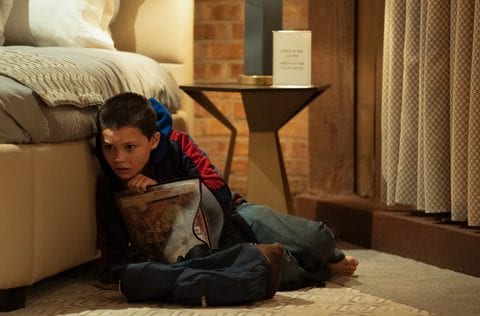
This being said, the comedy in this remake misses the mark for me. A lot of the punchlines feel cringy and forced. Perhaps this is because the humour is Americanised and so doesn’t fall within my personal taste in humour, but to me it felt weak. We’ve lost all sense of horror and unease, replaced by awkward jokes that don’t really land. The soundtrack tries to be creepy, but it lacks depth and suspense. The score no longer stands out as unique and spectacular, instead it blends into the background of the scenes. The vibe of the show is easy viewing that feels like it is aimed more at teens than for a mature audience, which would make sense with the age rating sitting at 15.
This is reflected in the demographics we see on screen. The series opens with fans of Dystopia (Utopia’s prequel, no longer called The Utopia Manuscripts)—which is now a comic book with a very public fan base instead of an underground mystery—all partying together in a hotel. The fans are at this event to celebrate the comic book and bid for an original copy of Utopia, the elusive sequel to their favourite comic book, which contains scientific secrets about pandemics.
The scenes from this event feel like a college party. Audibly, visually, that’s exactly where I would place the event. It feels in line with most typical, modern shows. It no longer aesthetically stands out, with no emphasis on the colour yellow, and no intensely oversaturated sets.
However, I appreciate the manuscript name change. Having two chronological comic books (or as Becky might remind you, graphic novels) called Dystopia and Utopia makes a lot of sense. It suggests that the hidden secret within the comic book can change the world from nightmarish to dreamlike.
Some other, less welcome name changes include Corvadt becoming Christie Bios (for no obvious reason), Lee becoming Rod (Michael B. Woods) (but we will talk about this more later), and Janus becoming just a bioweapon rather than a concept with a name and background.
Another important change is to the name of the biochemical created by Jessica’s father. Originally Janus, an ancient Roman word that means beginnings and endings (often artistically depicted by a man with two heads to symbolise looking to both the past and the future), was a symbolic name for Carvel’s creation. The chemical also acts differently, which is perhaps the most significant change to the narrative.
The original series struck up an interesting debate about what to do about the increasing human population on earth. Philip Carvel (Tom Burke) spoke a lot of sense—although in very crude terms—regarding what people might do to one another when the fight for resources takes off in the next few decades. His solution was Janus, a creation that can be put into flu vaccines and will sterilize 90% of the world’s human population. His colleague, Mr. Rabbit (Rose Leslie; Geraldine James), helped him to create such a thing. A key part of their argument for sterilizing what they predicted to be vast proportions population was that it would solve what they saw as ‘the overpopulation crisis’ without the need to actually take human life.
However, in this new version of the story sterilisation is seldom touched upon and the characters are left to believe that they are fighting a mass murder plot. While perhaps this idea is more exciting to some viewers, it lacks originality and a true moral dilemma. It is hard to call a mass murder plot a grey area so there is no discussion to be had.
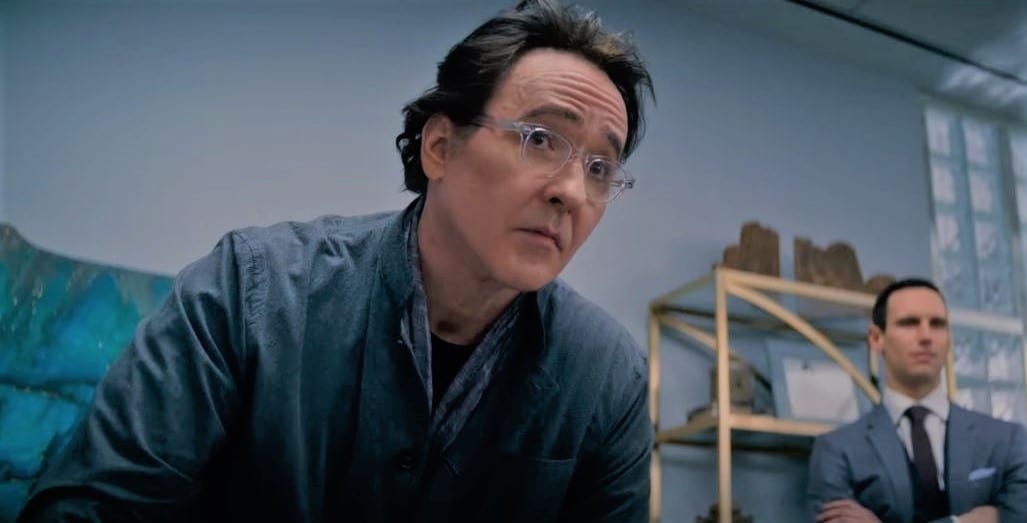
Because of this change, we have lost the key controversial debate and subsequent further discussions about racial genocide and revelations. One massive twist in the original Utopia was the realisation that the biochemical also stopped the vaccine working on those it sterilized. This negated the ‘no direct deaths’ aspect of the argument and led to much more exciting viewing. That kind of storytelling created the edge-of-your-seat tension that this remake lacks.
This is my main gripe with the new series. I feel that, aside from stylistic and character changes, we have lost the main point that Kelly was trying to make. Kelly is responsible for creating the original series, which was perfectly shot and executed. Interestingly, Dennis Kelly appears in the credits of this remake as executive producer. To see his name put to this remake was surprising for many reasons. Firstly, because the series has such a different vibe, and secondly, because the quality of Kelly’s typical work just isn’t here.
After deeper investigation, it seems as though Kelly wasn’t involved with the making of this remake very much. In an interview with Den of Geek, he expressed that although he had talked to Gillian Flynn about her ideas, he was keen to let this be her project and so “stepped back”. The executive producer credit is perhaps then more of a nod to Kelly’s ideas and creation than an implication that he had very much to do with this series.
Perhaps the most dramatic disappointment for me was the adaptation of Lee and Arby’s characters. The two men, once eccentric, bold, and darkly funny are now bland. Their distinct idiosyncrasies have become small quirks and, like the story, they lack depth. Arby (Christopher Denhem) now presents as asthmatic and slow, when previously he was presented with abnormal symptoms that were harder to label and pinpoint. It’s almost as if this series tried to present him with common ailments in order to push for inclusivity rather than show him with a random set of symptoms left over from the trauma in his childhood. Arby was never intended to be physically unwell, rather a physical manifestation of Carvel’s first experiments.
Thankfully, Arby’s name remains unchanged, although its meaning is never explained to us. Perhaps the writers wanted that to be a nice easter egg for those who had seen the original, or perhaps they intend to make a second season where things like this are addressed.
Before, Arby was a killer, but it was clear he was under the thumb of his partner. Now, it is more of a true partnership. It is Arby who tortures Wilson (Desmin Borges), making his later redemption arc feel less legitimate. This being said, Denhem does an excellent job of Arby’s facial expressions, and, although we have lost Arby’s perverse sense of charm and hints of vulnerability, his character does feel somewhat authentic. Hopefully, Amazon is planning on doing a second series and diving more deeply into some of these things.
Similarly, Lee has changed almost beyond recognition. This in itself is not necessarily a bad thing, but I can’t help but be disappointed by his lack of memorability and the erosion of what was perhaps the most vibrant character in Utopia. Lee is now called Rod, and he no longer wears bold suits or his hair in a quiff. However, Rod’s car is yellow, and the smiling bag of killing tools remains. Rod not only uses the trademark gas cylinder to murder his victims, but he has also branched out into injections of heroin.
Rod is also much sloppier with his work that Lee would ever have been. Lee always had plans and backup plans and left no stone unturned. Whereas Rod, when attempting to kill Olivia (Maya Kazan) (the person trying to sell a copy of the original Utopia manuscript at the start of the series), gives her slightly too low a dose of heroin, leaving her alive long enough to be found and questioned by Jessica (Sasha Lane), despite her friends all being killed instantly when he injected them. This is very convenient and makes the writing feel lazy. This is not the only time we have incidents like this.
Narrative
I think the simplification of a complex narrative is partly to blame for some things feeling a little bit… unbelievable. We are no longer avoiding clichés and common tropes, but instead embracing them. As we just touched upon, there are a lot of situations that just feel too convenient. Wilson spots Sam (Jessica Rothe) in the crowd at the comic book event just exactly as she is giving a big speech reflecting his own beliefs to the letter, Becky’s (Ashleigh LaThrop) physical manifestation of her Deals syndrome gets ludicrous at points, and Rod’s killing of attractive college-age young adults instead of realistic looking normal people in a comic book store, all seem to have prioritised cliché and dramatic effect over realism and nuance.
All of these things remind you that you are watching a made-up story. Instead of feeling pulled into the world of Utopia, I felt pushed out. I was constantly reminded that what I am seeing is fiction, because the chance of any of these things happening in real life is slim to none. The main stand out for me, besides Rod’s sloppy drug administration, is the ease with which Grant (Javon Walton) enters Alice’s (Farrah Mackenzie) life.
In the original Utopia, Grant meets Alice when she is at school and befriends her. He sneaks into her house to visit several times, and her mother never finds out. One day he accidentally leads Arby to the house, where Arby kills Alice’s mother. Grant and Alice then remain friends and are both ultimately adopted by the Dugdale family.
However, in the remake we watch Grant sneak into Alice’s garden to steal some fruit, and almost immediately Alice brings him inside for food and her mother (Crystal Fox) gives him a house key, telling him to come and go as he pleases as long as he promises her that he is trustworthy. This all feels very unrealistic. No matter how charitable a person is, the chance of them giving a house key to a young boy who broke into their garden just because he looks like he might need some help seems pretty slim.
A positive change to the narrative, however, comes in the form of a pair of twins. In order to ‘prove’ the vaccine works in an attempt to encourage members of the public to take the vaccine, Harvest arranges a trick. One girl from a twin pair is infected with the virus, and by swapping her out for her sister, they create the impression that there is a cure and it lies within the vaccine, thus urging others to take it. This is a clever twist but leads us into the next discussion point—plot holes. For surely a vaccine is intended to prevent disease, not cure it?
The original series was not free from plot holes, but the only major one was the implication that being sterile could be an inherited trait (I’ll let you figure out for yourself why this suggestion was problematic). However, the plot holes that emerge largely due to the condensed narrative are too frequent and big to ignore.
A major one comes near the end. The group breaks into the warehouse where the vaccines infected with the biochemical intended to halt human reproduction and cause mass loss of life are being stored. They begin to chaotically destroy them, spilling the vaccine onto the floor and likely contaminating themselves with it and all it contains. They do so whooping and yelling without a care in the world. Becky and Ian then share a kiss in the midst of the dangerous substance.
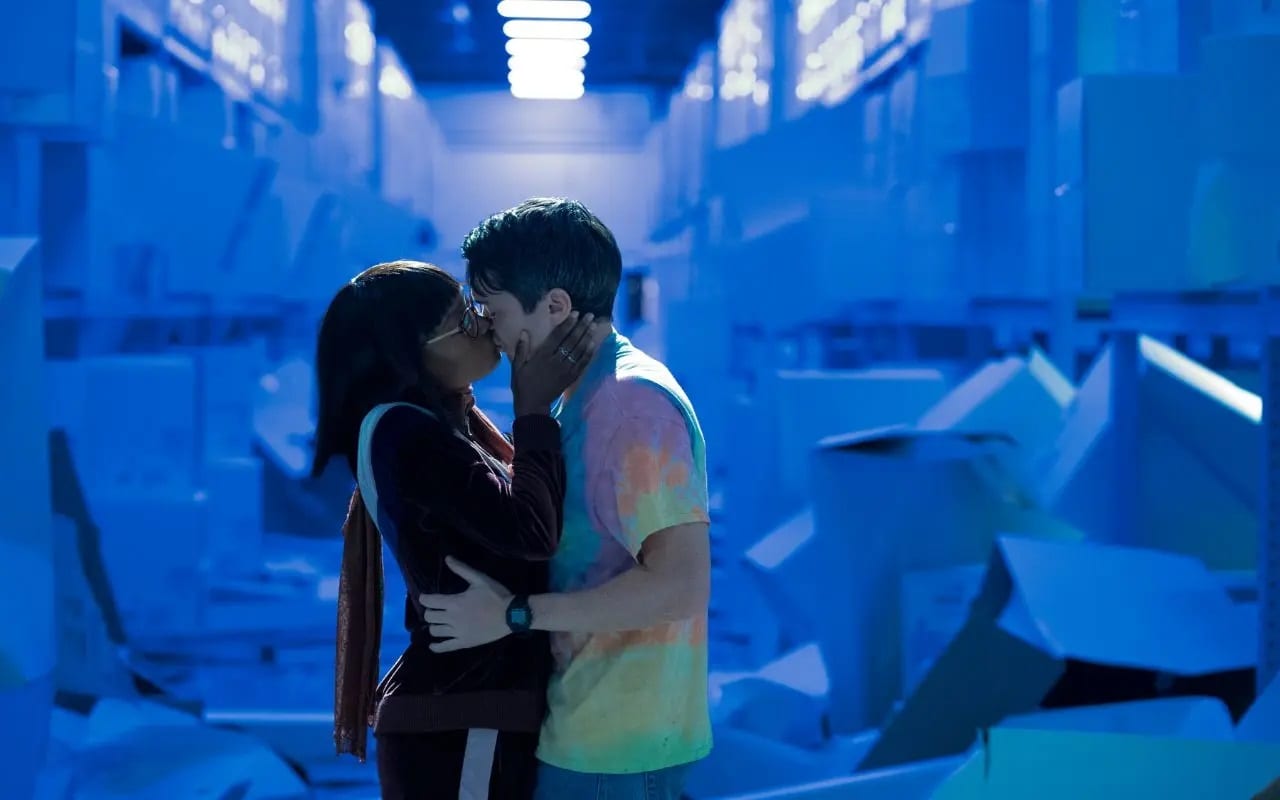
There was one other scene that I found particularly laughable. Becky, who in both renditions of the tale suffers from Deals syndrome—a degenerative disease causing seizures and eventually death—has a seizure and stops breathing. Ian (Dan Byrd) is desperate to revive her, enlisting Jessica to help. Jessica proceeds to cut into Becky’s throat (with an alarmingly small bead of blood), and jam in a kitchen funnel. Becky then stops breathing for a few more minutes. Ian and the others are in a state of shock and grief, while Jessica is planning the next stage of the plan.
After a few more minutes have gone by, Becky suddenly gasps, sits up, and starts talking. From that point on, there is no mention of her having Deals syndrome, and the only sign that she had died and come back to life, as well as been stabbed in the throat, was that she wore a scarf for the remaining episodes. This, of course, happens before she partakes in chaotically destroying a warehouse and its contents.
Ultimately, this all plays into the simplification of the narrative but the plot holes and insanely convenient flukes and happenings get a bit ridiculous. It impossible to forget that you are watching a fabricated story, whereas the original series very rarely lost touch of its realism.
Characters
This series gave us some old, some new, and some adapted characters. I especially liked the new portrayal of Grant. The work of Walton created a character who felt like a more honest depiction of what a young boy might act and seem like under pressure.
Grant has been made less aggressive and less violent. Instead of just being a kid who uses bad language and pretends to be an adult, boasting flashy cars and supermodel girlfriends, we have a slightly subdued version of Grant. He is still boasting about things far above his maturity level, but there are more indicators of his immaturity and more focus on him being a vulnerable child than on him being a badass. This is more age-appropriate, and, while Grant is still troubled and still makes mistakes, he no longer wears black eyeliner, constantly yells profanity at his friends, or feels overdone.
Another character I loved in this series is Michael’s (Rainn Wilson) wife. Now called Colleen (Jeanine Serralles), she immediately struck me as a more multidimensional character than Jen was. She seems genuine, powerful, and intellectual. I commend Flynn for bringing her to life. Instead of a weak, emotional wife and an affair that gets out of hand, Michael’s home life is now very straightforward. This is one simplification that I felt did streamline the narrative in a productive way rather than a detrimental way.
Towards the middle of the series, Colleen starts to push back against Michael, trying to stop him from risking his mental health and sabotaging his vaccine distribution. What seems to be a concerned wife stopping her husband from doing things because she is afraid that he might be suffering from a mental health crisis gives us something to be invested in.
Feeling the frustration on behalf of Michael as his wife impairs his research progress but also empathising with Colleen as she tries to protect her husband gives us a moral dilemma to be invested in. This storyline gives us a nice side conflict. As the series continues it becomes clear that Colleen is full of surprises.
It becomes clear at the end of Episode 6 that Colleen has actually been working to control Michael the entire time the couple has known each other, and that she is now going to dangerous lengths to make sure he holds his silence regarding the intentional nature of the flu outbreak. She was a sleeper agent with Harvest, which explains her clarity and self-control. This revelation is shocking, and creates a tension between the two characters that plays up to power dynamics, and defies gender roles.
Colleen is a truly excellent character. Even before the plot twist and her sudden control of Michael, she presents as someone with depth. When I began watching the series, she was the first character who gave me a strong first impression.
The only valuable thread that this storyline removes from the original arc of Michael’s character is the comedic aspect of ‘oh, that would happen to Michael’. His original storyline was wrought with unfortunate but not unbelievable circumstances, all showing him as a comedy character. Although I like the new direction of his character, I do keenly miss the amusement of Michael in the original series—especially when the comedic notes of this series fall so flat.
Alice’s mother is also a great character in terms of likeability. Originally, she didn’t play much of a role at all, but Kim is given a full personality, right down to her social awareness and her generosity. She did not have many scenes so there is not much else to say about her, but I enjoyed what she brought to the show.
Unfortunately, the majority of the remaining characters feel remarkably one dimensional compared to their predecessors. They have lost all of their previous complexity, and with this, they feel less human. Wilson never falters in his commitment to the cause of his friends. In fact, there is never even a discussion about what side the group is on until the very last scenes. Every character is black and white, with no internal battles or complex feelings, and no indication of deeper reflection about what any of their adventures mean. They follow Jessica without many questions and are always keener to stick with their group than to think independently.
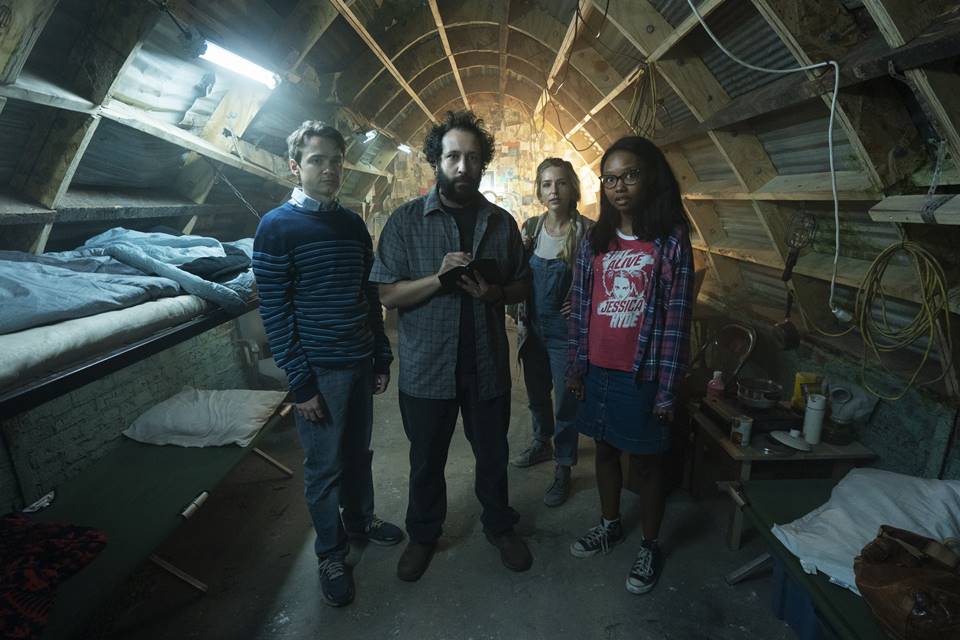
Because of this, the characters feel split into two teams. We have Harvest (The Network in the original series) who aim to ‘solve the world’s overpopulation crisis’, and we have a group of friends trying to stop Harvest. The characters on each team share the opinions of all those on their side. Not only is this lack of deviation dull, but it leaves us without any morally grey characters. We also have no space to wonder about the motivations and aims of any of the more powerful characters. This black and white categorisation makes them seem boring in comparison to their original counterparts who all had a plethora of good and bad dreams and motivators.
As we begin to meet our main characters, Becky appears wearing a yellow t-shirt. This is one of the few references to yellow that we get. We have a new member of the group, Sam, who is presented as the brains. Sam was not present in the original series, so I was interested to see where she would go. Unfortunately, I found her character pretentious and irritating and was pleased when she was quickly killed off leaving us with our original group of four. Sam is killed by Jessica, in a move that relieves viewers from Sam’s feigned intelligence, and proves Jessica to be a cold-hearted killer.
The cheesy romance vibes between Becky and Ian are a poor interpretation of the original series realistic, awkward, humorous relationship between the two. Instead of laughing along to the relatable struggles the couple has, we find ourselves instead cringing and wondering if this is really based on the Utopia we remember.
Let’s now talk about Jessica Hyde. She remains colder, bolder, and deadlier than her four sidekicks, but she lacks O’Shaughnessy’s steely glare and harsh grip of reality. She is a quirky character for sure, but she had big boots to fill, and the mannerisms and strength that we are used to can’t be found here. We have traded wit for pride, intelligence for weakness, and depth for a single dimension.
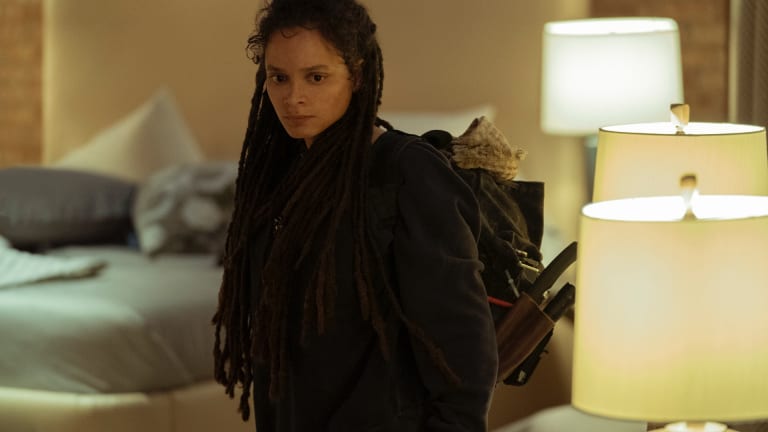
When Jessica finds out her father might be dead, she locks herself in a cupboard and cries for a long time. She behaves like a moody child. While this could be expected of someone finding out such bad news, Jessica Hyde is supposed to be cold, unfeeling, and always in control. Perhaps the director was aiming for a comedic effect but it doesn’t come across as particularly amusing.
Milner (Sonja Sohn), too, has lost her charisma. Milner plays a much less central role than she did in the original series. Although her actual position and her story remain largely unchanged, she is no longer a focus. She also falls victim to the lack of morally grey characters. In the original Utopia, Milner was one of the most morally grey characters of all. She played both sides before ultimately picking one, and we were left wondering about her right to the very end. This played into her intelligence, her intrigue, and her fill. Because this series made each character very black and white, we lost these intricacies of Milner, which I think is a real tragedy.
Milner’s counterpart, Carvel, is no longer a free spirit with a plan to save the world. They have even erased his love for Jessica, which takes away not only his entire motive for the genocidal choices he made but also subtracts his humanity from the equation. This leaves him like the shell of a man, one whose genius is put down to insanity rather than setting up a debate about humanity and moral righteousness.
I fell in love with the charm and the realism of the original characters but, overall, the new ones don’t shine as brightly.
Settings
The mood is very different in the remake than in the original Utopia. We see bustling backgrounds that are no longer eerie and have parties and upbeat songs that detract from the darkness of the story. We have lost the characteristics that gave Utopia its bleak, dark, horrifying undertones.
One set that is done particularly well is Wilson’s bunker. He takes his friends to his home and shows them the bunker he has for emergencies. The bunker is crammed with tins and research, looks homemade, and displays Wilson’s personality—although perhaps it isn’t a very realistic size. In true Wilson fashion, he is angry when they touch his canned foods, insistent that his bunker is a good idea, and fixated upon explaining how prepared he is for any negative eventuality.
My favourite thing about Wilson’s bunker comes in at around the fourth minute of Episode 2. As we are looking around, we see a wall that has his research pinned upon it. On a post-it note, there are the words “Call Dennis K”. Although this doesn’t mean anything to the plot, it is a nice easter egg.
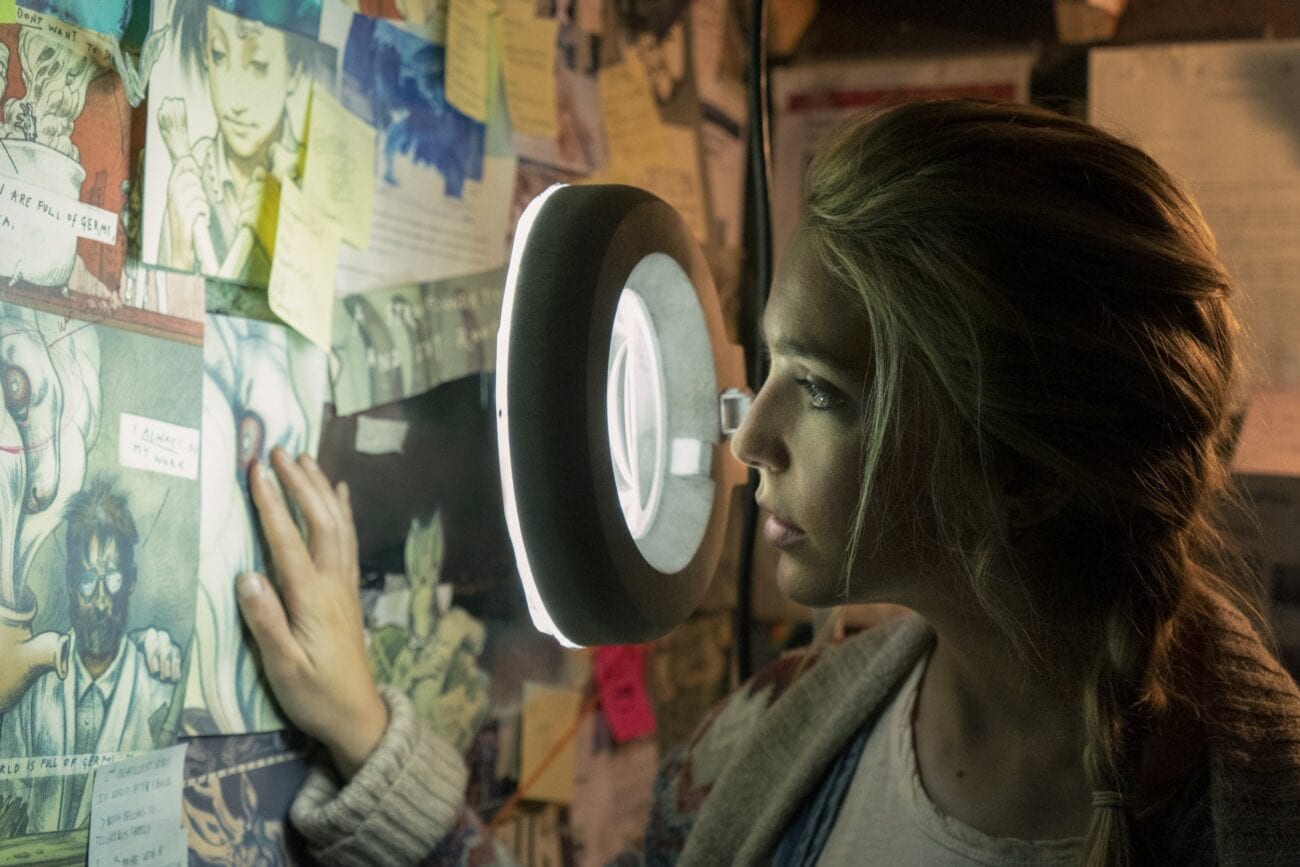
However, during one of his monologues, he ruins the mood by making claims too ridiculous, ones that the original Wilson would never have made because he would have known them to be impossible. He tells his friends he can last a week without water. Of course, this is something Wilson would surely try, but we all know that the claim is impossible and it jolts us again, reminding us that we are watching a show with a fictional narrative. This isn’t a huge deal, but it does ruin the scene for me a little bit.
Early in the series, Jessica tells her new friends about the yellow house she grew up in. We don’t get a visual until much later, but when we do the house is a pastel, pasty looking yellow. It is not the bold, statement yellow we are expecting. This is not important but is a small disappointment.
Near the finale (in Episode 7), Becky and Jessica are sitting on a seat in a corridor near the hospital lab rooms, the walls are half white and half yellow. It is aesthetically beautiful and another nice callback.
Style
Channel 4’s Utopia inarguably had its own distinct style. Everything was washed with bright, glamourised yellows, all the colours were saturated and deliberate, and the score fit perfectly with what we were seeing on-screen. Regarding this, one scene in particular springs to mind. When we are learning about Carvel’s experimentation on his son, his wife realises what has happened. She opens her mouth to scream and TV clichés lead you to expect a loud, shrill screech. Instead, no sound comes out of her mouth. We watch her scream silently while the rising noise of orchestral violins fills the void. This remake is missing the unique style of its predecessor in more ways than one.
In the original show, Utopia’s stylisation is part of what made it stand out, and to remove this when trying to recapture the story means that we have lost some of the spark that initially drew us in.
A lot of the focus stylistically has shifted. It is no longer about the aesthetic but about the action happening on-screen. Whether this is positive or negative is down to personal perception. A great example is Wilson’s torture scene. In the original series, this scene was very much about the aesthetics of Lee, the camera angles representing the power dynamics and the space the characters occupy, and emphasis on the pain Wilson feels rather than the actual acts that are done to him. Wilson’s torture here is less artistic, in favour of a brutal, graphic depiction. This perhaps is more impactful and shocking to viewers, but it lacks individuality and feels like a more generic approach to violence.
Similarly, Rod and Arby’s murder spree becomes boring. Instead of creating unique scenarios and interesting methods, we are simply shown a montage of shootings, all happening in a similar place under similar pretenses. Although it speeds the story along whilst getting across the point that the pair are very dangerous hitmen, it feels lazy and I felt myself starting to lose interest.
Some of the stylistic discrepancies in the remake bleed into other areas such as production. There are times when the editing and the effects fall short. Some of the action scenes—notably those between Jessica Hyde and Arby—feel false, and like something out of a cheap thriller.
One scene done particularly well in terms of style was the field hospital setting. It’s important to note that well doesn’t necessarily mean closest to the original style. In this context what I was hoping for were interesting changes, but ones that didn’t take away from the origins of the story and the style.
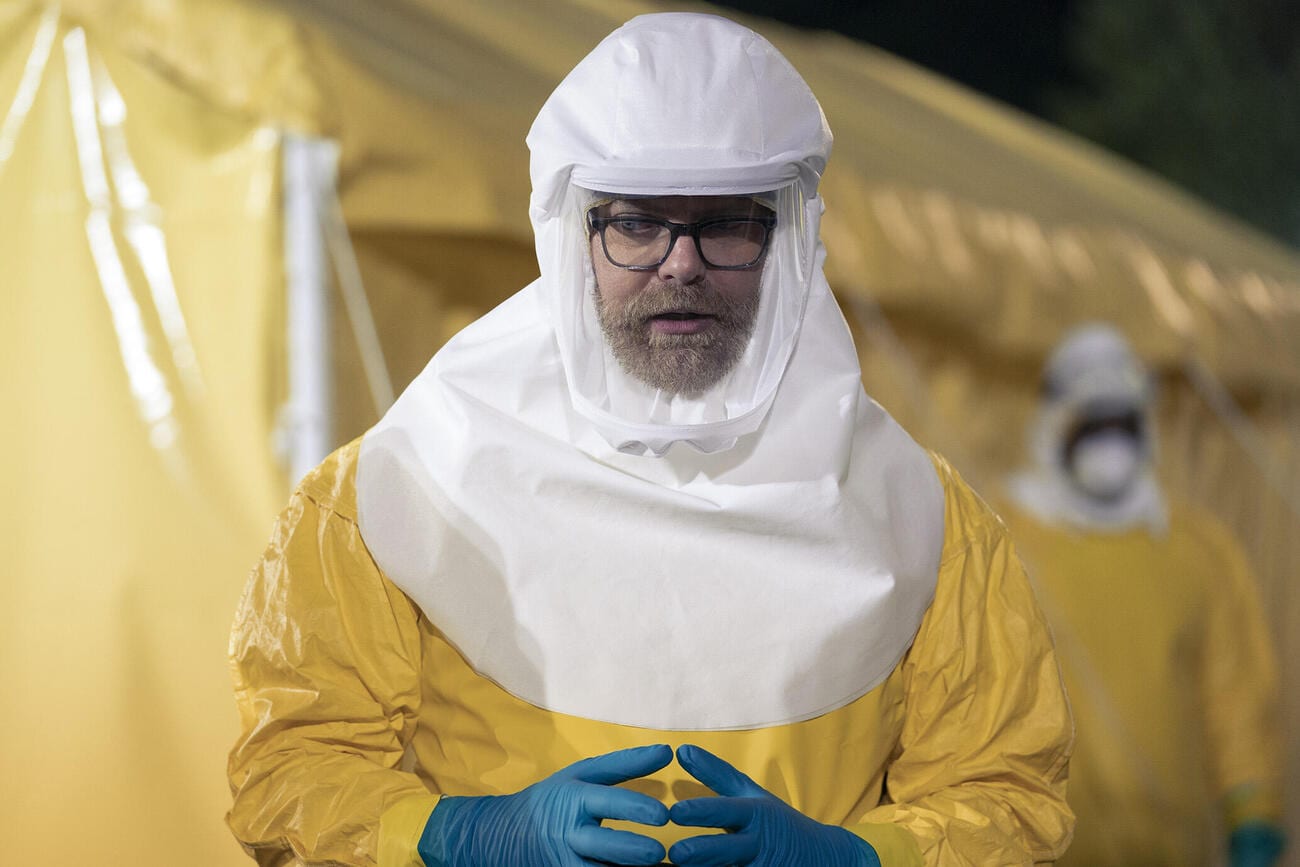
Seen predominantly in the fifth episode, this setting is very reminiscent of some of the colours and moods of classic Utopia. The plastic screens in the field hospitals are yellow, but this is not emphasised. That being said, the first scenes of Episode 5 are the closest we get to a style reminiscent of the original series. The mood is creepy, everything is bathed in yellow, and we are struggling to figure out the mystery that is before us.
This is where the twin-swap storyline takes place. Dr. Kevin Christie (John Cusack), orchestrater of the whole operation and owner of Christie Bios, does a great job of selecting people for this role. Aside from the story thread relating to Colleen and Michael, this was my favourite addition to the tale. Twin experiments are exactly the kind of thing you might expect in a world of genetic engineering, genocidal debate, and a lack of regard for the rights of people already living. It fitted in perfectly and added a welcome bit of wonder.
The scenes preceding this field hospital setting, where a cordon is drawn up around the infected area, felt very reminiscent of scenes from another Channel 4 show, Containment. The portrayal of families being separated and people trying to cycle home to find a large fence being erected felt similar to the exact stories in Containment.
Overall Impressions
This adaptation is perfect for you if you found the twists and turns of the original series hard to follow, or if you weren’t a fan of the original casting. There are some nice additions—such as Jeanine Serralles—and overall, the series is entertaining. The final episode really steps up the game and gives us a little more depth and excitement.
The problem for me is that the things Flynn adds are often excellent, but the things she keeps the same are done in the shadow of having been done better in the past.
There is more frequent action, less lingering on colours and aesthetics, and a bigger focus on the fake flu plotline than its surrounding threads. This narrower story makes for more intense viewing and it is easier to concentrate on what exactly is going on. While the original series was easy to get lost in plot-wise, this one is much easier on the viewer.
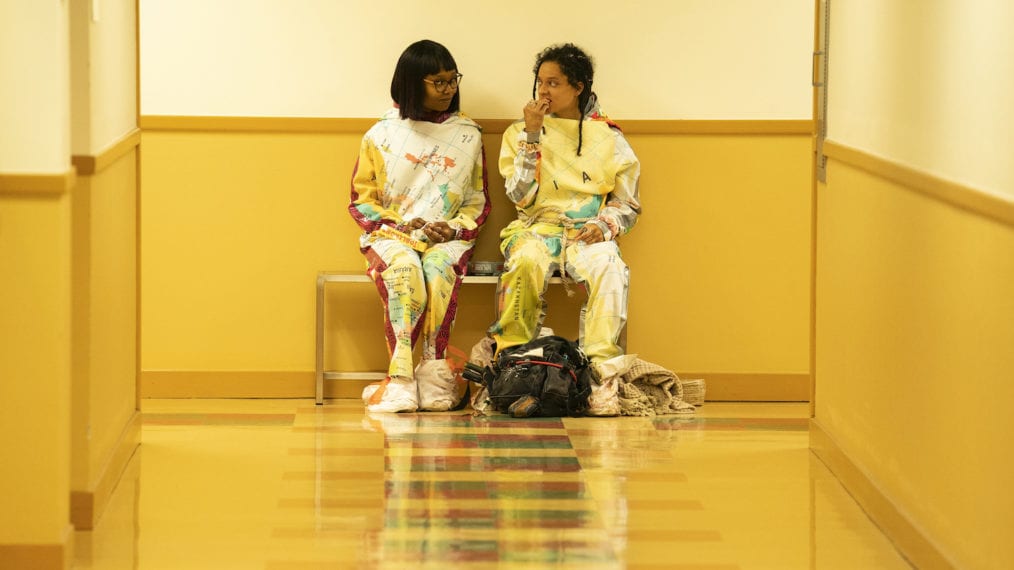
Much as I would have loved to see a fresh take on the show—one with different twists and turns, new angles, and new backstories—unfortunately, the changes that were made were too plain for me. Much as I tried to stop comparing the two, this is very difficult when the stories remain so similar and one feels much more considered than the other.
This remake perhaps might have worked out better if Flynn had tried to write an entirely new storyline, instead of sticking so closely to the original one with just mediocre changes. With the story so similar, it is impossible not to draw comparisons at every turn, and find that this adaptation fell short at almost all of them.
What I saw here was essentially a dumbed-down version of an iconic show. This makes it more accessible and may draw attention to the original series, but it doesn’t hold a candle to the original work of Dennis Kelly.
Perhaps the real issue, then, is that the target audience for both seems to be very different. While this makes sense from a marketing perspective—you want maximum reach and aiming this remake at a different audience might help achieve this—it will alienate many fans who only start watching because of their love for the original.
Concluding thoughts
Instead of being left with Wilson’s dramatic transformation into Mr. Rabbit, we are left with very little by way of genuinely infuriating cliff-hangers. If you did not watch the original or are looking for something lighter, easier, and less unnecessarily complicated, you may find that this series is for you. While it lacks some key elements of its predecessor, the story is largely intact and it makes for great casual viewing.
If you are after a simple, intriguing tale fraught with betrayals, mysteries, and action then this is for you. There is more than enough by way of action to make up for what is lacking in psychological debate if that isn’t something you look for in a show. With all that’s going on in the world, this is the perfect balance between touching on important topics and not drowning in depth and intensity.
Ultimately for me, the series was fighting a losing battle for my attention. It felt like a bid to use violence and unfulfilling plot twists to keep me watching when really the narrative is weak and full of holes. What little substance was there, unfortunately, didn’t leave me wanting more.


Amazing write up! Couldn’t make it through the first episode of this re-make, but I have to credit it for reminding me of this fantastic show that I loved seven years ago. Neil Maskell man… so good
Neil Maskell was easily one of my favourite parts of the original. The whole show was so incredibly well done and it’s such a shame it was cancelled
Brilliant article. I started with the american version then discovered the British and never went back. Gutted it got cancelled